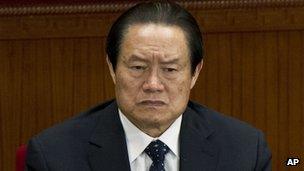China: Trouble at the top?
- Published
- comments

Has China's top leadership been split by the purging of rising star Bo Xilai and the political waves that has caused?
And is it now covering up to preserve a facade of unity ahead of the major leadership change due this autumn?
The machinations of the Communist Party's Politburo Standing Committee, the nine people who run China day to day, are always kept secret to ensure a sense of stability in this country of 1.3 billion.
For the Communist Party that's especially important now, ahead of the power handover - a time deemed highly sensitive.
But today no fewer than four newspapers, including the Legal Daily, carry lengthy front page reports about a speech given by China's hugely powerful security chief Zhou Yongkang. The Communist Party's mouthpiece the People's Daily covers it on page two.
In it Mr Zhou, long seen as a hardliner, speaks of the dangers of Western, democratic influences undermining the rule of the Communist Party, saying "we must have a clear head and a clear-cut stand to confidently boycott those trains of thoughts that attempt to Westernise China, separate China and bring chaos to China".
What's interesting is not so much the content of the speech, which isn't new, but the prominence it is given. Photographs of Mr Zhou, one of the members of the Standing Committee, appear on the qq news website.
'Rumour mill'
Observers of China sometimes point to a variant of the old adage "there's no smoke without a fire". They say if the propaganda chiefs insist something is the case, and go to great lengths to do so, then the opposite may be what's happening.
So is this propaganda offensive designed to give the impression that Mr Zhou is still very much an active player in the Standing Committee? And is the truth that he has lost his fight for political survival?
The rumour mill in Beijing has been churning for weeks with suggestions that Mr Zhou has been locked in a power struggle.
The Financial Times said on 20 April that "numerous sources... believe Mr Zhou is fighting for his job". I wrote about how there were even rumours of an attempted coup by Zhou Yongkang and supporters of Bo Xilai.
At the weekend the Financial Times reported that, according to three senior Communist Party members and diplomats, Mr Zhou has now been stripped of his role overseeing internal security because he was the only one of the Standing Committee members to have argued in favour of Bo Xilai.
The paper says he will not officially be fired as he is due to step down with the majority of the other senior leaders in a few months and the Communist Party does not want to be seen to be divided.
So Mr Zhou may have fallen, we don't know. But what is the significance if he has?
'Internal security'
The Financial Times says one of its sources has "characterised the current political strife and the purge of Mr Bo as 'a symptom of the ideological struggle caused by disagreement over which direction the country should go in'. Some officials within the party, including Premier Wen Jiabao, are trying to push through political reforms that would move China towards Western-style democracy while hardliners, including Mr Zhou, are opposed to such a move."
That's an optimistic reading. But the informative Sinocism blog gives a useful antidote "for those who think this somehow means a victory for the oft-referenced, rarely (never?) seen liberals/reformers/softliners". It points to analysis by the long-time China watcher Willy Lam that prospects for political or legal reform are dim.
In the Jamestown Foundation's China Brief Mr Lam catalogues how China's vast law-enforcement apparatus amassed huge power under Zhou Yongkang, especially since the 2008 Olympics and the unrest in Tibetan areas that year.
As Chair of the Political and Legal Commission, Mr Zhou has been in control of the police, the secret police, the prosecutors and the courts, and a giant network of informants. He also shared joint control over militia and paramilitary forces with military authorities.
Willy Lam points out that China's internal security forces now have a bigger published budget than China's military does. The budget has grown from 514.0bn yuan ($81.3bn) in 2010 to 701.7bn yuan ($111.1bn) this year. China's senior leaders oversaw and approved the build-up.
Mr Lam goes on to say that all the signs are that this focus on internal security and stability will continue to be one of the Communist Party's main priorities.
He writes: "As things stand, there seems to be a strong consensus among the Standing Committee members - including Xi Jinping and Li Keqiang, who are expected to form the axis of the upcoming Fifth-Generation leadership - that they must pull out all the stops to boost security and stability."
If you want evidence for this, he says, look no further than the crackdown now taking place on any who may have helped the blind activist Chen Guangcheng escape his house arrest and flee to the US embassy last month, causing huge embarrassment for China's internal security forces.
- Published26 July 2012
- Published17 April 2012
- Published31 March 2012